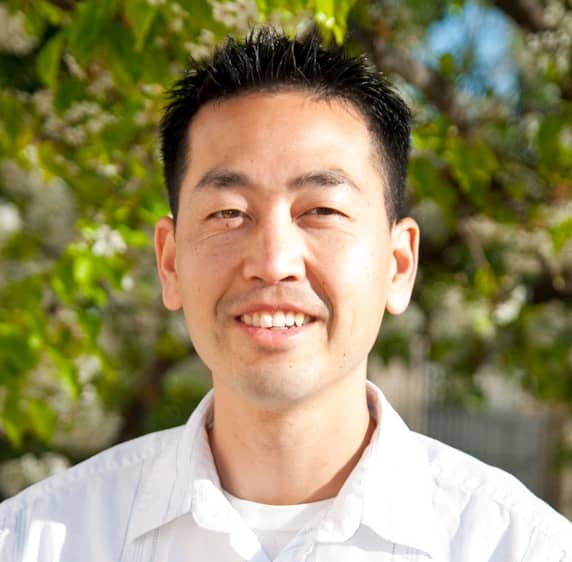
The bad news is that we are all sinful by nature and sinful by choice. We all choose to worship the creature above the Creator and to chase idolatrous desires (Romans 1:21-25). We do what we do because we want what we want: We see; We covet; We take; We hide. Therefore, “none is righteous, no, not one; no one understands; no one seeks for God” (3:10-11).
The good news follows: “But God shows his love for us in that while we were still sinners, Christ died for us” (5:8). The sinless Son of God, who himself was tempted like us, became our Savior and accomplished victory over sin. He died on a cross to take his Father’s wrath and bore God’s judgment in our place. Though we deserved spiritual death as the consequence for our sin (6:23a), Jesus rescued us from sin: past, present, and future (v. 23b). “There is therefore now no condemnation for those who are in Christ Jesus. For the law of the Spirit of life has set you free in Christ Jesus from the law of sin and death” (8:1-2).
Freedom from the Penalty of Sin
In Christ, therefore, we say “No” to our shame and guilt as we are set free from the condemnation of past sin. David, for example, was an adulterer, deceiver, and murderer. Yet he could cry out to the Lord, “Have mercy on me, O God, according to your steadfast love; according to your abundant mercy blot out my transgressions. Wash me thoroughly from my iniquity and cleanse me from my sin!” (Psalm 51:1-2). After being forgiven through the promise of the coming Messiah, David became a man after God’s own heart (1 Samuel 13:14). In Christ, we say “No” to sin’s penalty of death.
Freedom from the Presence of Sin
In Christ, we also say “No” to a sin-cursed future, for there will come a day in glory when we no longer experience indwelling sin or struggle with temptation. We will be completely free from the world, the flesh, and the devil (Ephesians 2:2-3). Imagine never again battling with anger, lust, deception, or shame. In eternity future, we’ll be sinless like Christ—perfectly righteous in the eyes of God (1 John 3:2). “For those whom [God] foreknew he also predestined to be conformed to the image of his Son, in order that he might be the firstborn among many brothers. And those whom he predestined he also called, and those whom he called he also justified, and those whom he justified he also glorified” (Romans 8:29-30). In that glorious day, we will finally be free from even the presence of sin.
Freedom from the Power of Sin
Most immediately, in the power of Christ, we can say “No” to present sin. As Paul declared, “Those who live according to the flesh set their minds on the things of the flesh, but those who live according to the Spirit set their minds on the things of the Spirit. For to set the mind on the flesh is death, but to set the mind on the Spirit is life and peace” (Romans 8:5-6). The flesh refers to our selfish desires, but the Spirit to the mind of God.
Application Insight: Before becoming a Christian, you are unable to choose the Spirit over the flesh. Yet once you are in Christ, you have the power to say “No” to sin because Jesus said “No” as the sinless Son of Man. Jesus said “No,” so that you could say “Yes” to something far better. Therefore, in Christ, you put off sin and put on godliness in its place (Ephesians 4:22-24). You halt sin’s deadly pattern in which you see, covet, take, and hide. In Christ, you say “No” to sin and “Yes” to godliness as you live according to the Spirit and not according to the flesh.
Consider four practical principles for application. First, we must fix our eyes on the Lord instead of gazing on temptation. Eve saw the fruit, Achan saw the silver, and David saw the wife of another man. Yet what if Eve focused her heart instead on the goodness of her Creator? What if Achan strengthened his resolve with God’s promised blessings in the land of Canaan? What if David set his mind to write another psalm of praise to the Lord? Sin is always rooted in our unbelief, so we must be captured by the truth in order to overcome. Yet faith in Christ must develop over time and becoming an expert “swordsman” (see Ephesians 6:17b) requires the daily practice of saying “No” to sin and “Yes” to Christ. Our Lord showed us how to resist temptation by trusting in his Father’s Word, maintaining intimacy in prayer, and relying on the Spirit’s power (Luke 4:1-13).
Application Insight: It is not enough to simply say “No” to drugs, or gambling, or pornography, or materialism, or spouse idolatry, or child-centered parenting. You must instead, as Thomas Chalmers preached, fill your mind with the expulsive power of a new affection. You must love Jesus more than you love your sin. This practice begins by delighting with God in prayer and meditating on his Word (Psalm 1:1-3). It comes through spending time in the fellowship of believers and truly rejoicing in the gospel (Acts 2:42-47).
First, we seek the Lord instead of seeking sin. Second, we cultivate right desires instead of covetous ones. Avoid desire for the wrong things, but also desire for the right things in the wrong way. David’s desire was just plain wrong, but Joseph’s brothers desired their father’s affection. This was the natural longing of any child, but they sought to achieve it by sinful means. So also, we discern when we have desired something wrongly or have sought the right desires in sinful ways. The man who binges on pornography satisfies a wrong desire, but his desire for relational intimacy is natural and God-given. The woman who nitpicks her husband may yearn for his affection—a right desire in marriage, but a wrong way to pursue it. Only when we examine our desires honestly, can we then address them rightly.
Our world, by contrast, implores us to simply replace our wrong desires with new ones: “Instead of cigarettes, chew gum. Instead of alcohol, find a support group. Instead of porn, join a gym. If you cannot find a spouse or please the one you have, then at least be successful in your career. When one idol fails you, simply replace it with another.” Our world’s theology of desire is a pyramid scheme set to fail because it denies the supremacy of Christ. Our Lord, however, said “No” to such worldly thinking. He would not turn the stones to bread since he trusted in his Father’s goodness and he would not test his Father’s power for the sake of showing off. He refused to seize his Father’s kingdom because his time to rule had not yet come.
Application Insight: Christ-followers consistently desire the right things in the right way for the glory of God. There’s nothing wrong with chewing gum or accountability groups or a gym membership. A successful career or a loving spouse are good desires, but make sure you examine your heart: “Am I pursuing these desires for the right reasons and in the right way? Do I ultimately desire the glory of God?” If not, you are simply replacing weak idols with stronger ones.
So, we seek the Lord instead of sin and desire rightly instead of coveting. Third, we give generously instead of taking. Korah and his followers should have faithfully served the Lord instead of jealously desiring the position of others. Yet too often, we take what does not belong to us because we think that we deserve it. We complain that “It’s not fair!” and steal from others to restore what we believe is right. Instead of taking, however, we must give generously from what we receive from God. According to Ephesians 4:28, “Let the thief no longer steal, but rather let him labor, doing honest work with his own hands, so that he may have something to share with anyone in need.” He doesn’t stop being a thief until his desires have truly changed. When he fully realizes his forgiveness in Christ (1:7) and the spiritual blessings he has received (v. 3), he will then seek to do good works (2:10) and to serve the members of Christ’s church (4:11-13).
Application Insight: In Christ, you become a generous giver by learning from the example of Jesus who “came not to be served but to serve, and to give his life as a ransom for many” (Mark 10:45). So, receive God’s gracious gifts with joy, then use those gifts to bless all those around you. In Christ, you will not worry about accumulating for yourself because you are so focused on giving yourself away.
True Christ-followers seek the Lord, desire rightly, and give generously. Finally, we confess honestly instead of hiding behind shame. When we do mess up (as sinners often do), let us run toward Christ instead of running away from him. According to Proverbs 28:13, “Whoever conceals his transgressions will not prosper, but he who confesses and forsakes them will obtain mercy.” In Christ, we are fully forgiven through his mercy and his grace. In Christ, we have no reason to hide even when we have messed up royally.
Application Insight: Apply these truths to your personal struggle with sin. In the past, you would see, covet, take, and hide, then suffer the deadly consequences. Yet in Christ Jesus, you have learned a better way.
First, examine your eyes: How does what you see tempt you toward that sin? What are you letting into your mind through the eye gate of your soul? What’s in your line of sight on TV or social media? What desires and habits do you need to change in order to seek the Lord instead of seeking sin?
Second, examine your heart: Are you desiring rightly or coveting with wrong desires? What are you wanting in the midst of your temptation? Is that either a wrong desire or a wrong way of achieving that desire? How can you want the right things in the right way for the glory of Christ?
Third, examine your actions: Consider how you do what you do because you want what you want. How then do rightly-ordered, Christ-centered desires lead to godly behavior?
Finally, examine your failures: What do you do when you mess up? Do you turn to Christ immediately or do you run and hide? Because of Christ, you can say “No” to sin even after you have already sinned. In Christ, you need not be enslaved to sin or accept the worldly practice of replacing weak idols with stronger ones. You have everything you need in Christ: forgiveness for past sin, power to overcome present temptation, and the promise of future glory. “Therefore, . . . walk in a manner worthy of the calling to which you have been called” (Ephesians 4:1).
12/1/2022 6:45:44 PM





